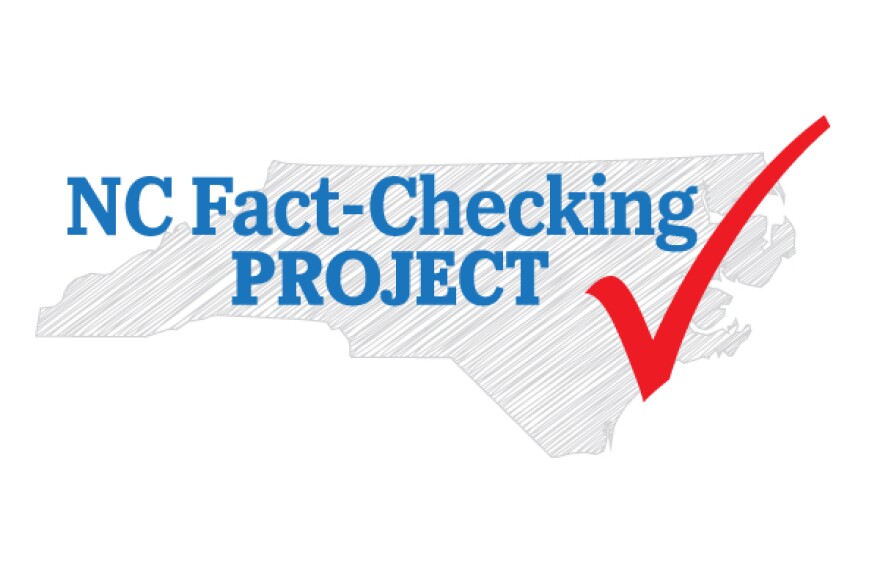Hundreds of teachers rallied at North Carolina’s state capital last week to call for more resources for educators and students. A lot of demands and claims and counter claims swirled around the gathering – from teacher’s groups and Republican lawmakers. That meant the Raleigh News and Observer’s Paul Specht was busy. He joins WFAE's "Morning Edition" host Lisa Worf.

Worf: You covered a lot of ground this week. Where does the truth-o-meter stand on these claims?
Specht: We sort of tucked the truth-o-meter in our back pocket and said, okay, let's look at just the most prevalent claims that are rising to relevance this week and add some context and add some more information so that people can make decisions for themselves.
Worf: What claims stood out to you?
Specht: One thing that stood out to me was that both sides sort of exaggerated their plight and their successes. For instance, Progress NC and the North Carolina Association of Educators, sort of the lobbying group for teachers, they hosted an event in Charlotte on April 24 and they said quote, "politicians in Raleigh have done almost nothing to reverse long term cuts to our public schools."
Well, part of that statement is subjective. But it leaves out important context. It's important to note that teachers have received raises each of the past five years and there's another proposed this year. Also, the legislature has increased annual spending on K-12 schools each year since 2013 and 2014. And that's all public record. Little statements like that from education advocates are a little misleading and lack context.
By contrast, some in the legislature also embellished how much they've done for teachers. For instance during the rally, there was a poster in the legislature that people were passing and it had, "the old Democrat pay plan for teachers" on one side and then they had the 2019 Republican pay plan on the other.
It's misleading because it said that the Democrat pay plan was from 2013-2014 and that was when teacher salaries were stagnant and were low compared to 2019. Democrats didn't have control of the legislature in 2013. Republicans did. And so this poster, it made it seem like Democrats were responsible for the low salaries in 2013 and 2014 when they weren't.
Worf: Now, as far as teacher's demands. When teachers are asking for more resources what exactly do they want?

Specht: They could be referring to a number of things from money for textbooks to teacher pay to per pupil funding, also known as per student funding. Although this time the organizers also were interested in funding for staff positions like counselors, psychologists and things like that.
Worf: So what were some of those specific demands that we were hearing about at this time.
Specht: They want, first of all, the minimum wage to be raised to $15 per hour for every school employee including teachers down to bus drivers and people like that.
Last year, the state did raise the minimum wage for most public school employees to $15 but it excluded temporary workers and community college employees. And so one of the demands of the ralliers was to fill that gap and bring it up to $15 an hour for everyone.
They want cost of living adjustments for public school workers who have retired.
They also want the leaders in the legislature to bring North Carolina up to the national standard for counselors and social workers and other staff positions like that. And when I say bring it up to the national standards that means they want one counselor for every 250 students. That's what the American School Counseling Association recommends.
Worf: And where is North Carolina now on that ratio?
Specht: Well, when it comes to counselors there are only 12 states that have better ratios than we do and each of those states has a smaller population than North Carolina. So there's room for improvement but we're doing pretty good compared to the rest of the country in that regard.
Worf: I don't see numbers attached to these requests so how much more money are we talking about to meet these demands?
Specht: Some lawmakers in the legislature asked the fiscal research staff, which is a nonpartisan research and analytic staff, to look to the numbers and see how much would it cost to accomplish all of these demands. And an overall number is difficult to come up with because one of the requests that we haven't mentioned yet is expanding Medicaid. And since we don't know exactly what that looks like it's unclear how much the overall cost would be.
But for things like adding counselors that would cost $700 million to bring North Carolina to the national standard of one counselor for every 250 students.
It would cost another $240 million a year to adjust the cost of living for retired public school employees.
And then to bring every public school employee to $15 per hour that would cost $110 million. So these demands altogether cost in the hundreds of millions to accomplish.
Worf: And what about teacher salaries? I imagine that was part of the list.
Specht: That's right. And every year there's a group that comes out with rankings for each state. That's the National Education Association. We were last year ranked 34th in the country in teacher pay. Earlier this year they came out with a new estimate on our average. They believe it is about $53,000 to $54,000 a year for the average North Carolina teacher. That would put us at 29th in the country. And so there were some inaccurate posters and flyers that were being handed out with just outdated numbers.
Paul Specht will be joining WFAE’s Morning Edition every Wednesday to Fact Check North Carolina news. If you have any claims you want the PolitiFact team to check out, you can email them at factcheck@newsobserver.com.



